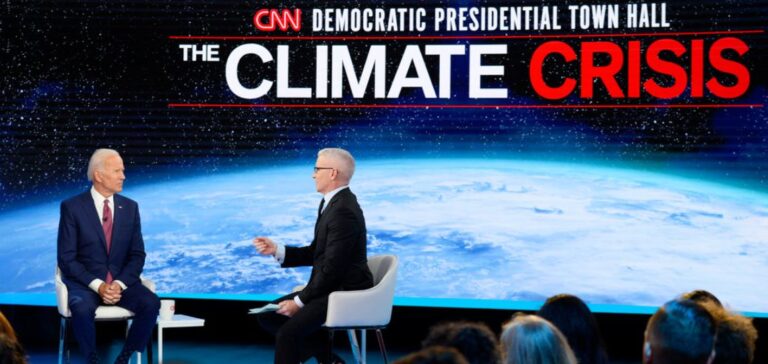One year on, Biden’s climate plan is making a difference in the United States. However, it is causing concern among our Asian and European allies.
Plan objectives: Transition to clean energy and electric vehicles.
The aim of the plan, which includes $370 billion in subsidies and tax cuts, is simple: to enable the United States to develop an industry for both clean energy production and the development of electric vehicles.
This plan is “proof that the United States is really getting on with it”, stresses Joshua Meltzer, a researcher at the Brookings Institution, while the European Union (EU) and China, in particular, were already supporting their energy transition.
As a symbolic measure of this ambition, the purchase of an electric vehicle is now subsidized to the tune of $7,500, as long as the vehicle and its components are assembled in North America.
Controversies and adjustments: International reactions and adjustments to the plan.
Originally, the idea was even more restrictive, since it was to be “made in USA”, but the strong reaction from Canada and Mexico, who saw it as a measure that ran counter to the existing free trade agreement between the three countries (ACEUM), forced Washington to review its copy.
“The latest versions of the text were negotiated in secret and in haste to secure the necessary votes, but they got it wrong”, recalls Jeffrey Schott, senior researcher for PIIE, with “unexpected consequences for some of our close allies”.
The latter were quick to raise their voices, as was the case in South Korea, which feared that its automakers would be excluded from the $7,500 subsidy. The same applies to Japan, even though Japanese automakers already have a strong industrial presence in North America, but the specificities of the subsidy, in terms of the provenance of certain critical materials, has fuelled fears. These fears were allayed by the signing of an agreement between the two countries at the end of March, making vehicles incorporating components or materials produced or processed in Japan eligible.
“The Treasury has had to get creative in how the law is to be implemented,” says Schott, including playing on what a free trade agreement is “whose definition is broader in the US than elsewhere”.
European concerns: Competition and energy costs.
A similar agreement is being negotiated with the EU. The worry: green investments leave Europe to benefit from IRA aid. European industry has been suffering from unfair Chinese practices for years.
Not enough to dispel fears, however, as “Europe is already having to cope with rising energy costs due to the war in Ukraine. In this respect, the IRA comes on top of other factors creating competitiveness problems for the EU”, points out Joshua Meltzer.
At the end of July, three ECB economists pointed out that the IRA could have a severe impact on certain European sectors. Exports of electrical and optical equipment could fall by 10 to 40% depending on the scenario. All in all, this would mean a loss of production of between 0.5% and 3% for the European economy.
Realization of investments : Positive effects in the United States.
Meanwhile, the effects of the IRA are already being felt in the United States. The White House reports that $110 billion has been invested.
“The investments announced in the last twelve months exceed those made in the previous eight years,” assured Jason Grumet, president of the Clean Energy Association, in a report published at the beginning of August.
“We are seeing significant investment in the United States, and this is probably partly to the detriment of investment in Europe or Asia”, believes Mr. Meltzer, even though “investment is growing all over the world”.
This could prompt the EU and Asian countries to step up their aid in turn, in order to avoid stalling.
Subsidy wars: Risks and economic attractiveness.
For several months now, the IMF has been warning of the risk of a “subsidy war”. Such a war would be costly for the public purse and have limited economic impact.
Jeffrey Schott doesn’t share this fear, however, believing that “the political risk (associated with this) seems to be growing, and companies can’t afford to wait and see who comes out on top”. But “if you’re in an energy-intensive sector, the USA is becoming increasingly attractive,” concedes Joshua Meltzer.






















